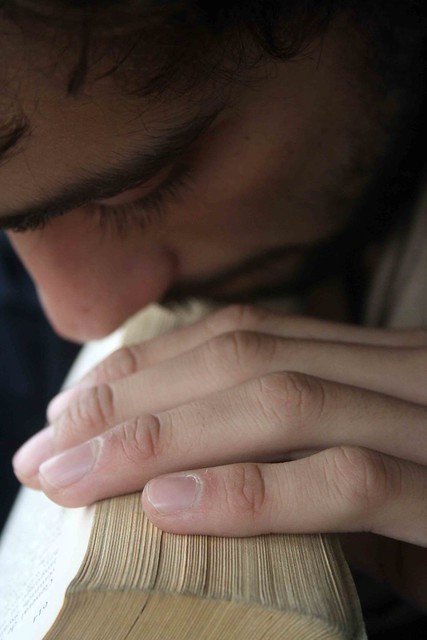
City Reading – The Delhi Proustians – III, Indian Coffee House

A la recherche du temps perdu.
[Text and photos by Mayank Austen Soofi]
Today is the third meeting of The Delhi Proustians, a club for Delhiwallas wanting to discuss French novelist Marcel Proust. Every Sunday noon we read his masterpiece, In Search of Lost Time, for an hour.
It is 12.05 pm and The Delhi Walla is at the table with Jonas Moses, a French man living in the city. We are reading Swann’s Way, the first of the seven volumes. It is the first time I’m not the only one attending the club’s reading session. “I came here for three reasons,” says Mr Moses. “I’m a reader of your website. I feared your pronunciations of the French names in the novel might be terrible, and they are. I’m hungry and I hope you will pay for my meal.”
Mr Moses orders a 2-egg omelet, two vegetable cutlets and cold coffee. There is no madeleine on the menu. A small shell-shaped sponge cake, madeleine is the centerpiece of Marcel’s most famous passage.
We turn to page 64 in Mr Moses’s copy. It is winter. The narrator has just returned home. On seeing him cold, his mother offers him tea and madeleines. The narrator writes:
And soon, mechanically, dispirited after a dreary day with the prospect of a depressing morrow, I raised to my lips a spoonful of the tea in which I had soaked a morsel of the cake. No sooner had the warm liquid mixed with the crumbs touched my palate than a shudder ran through me and I stopped, intent upon the extraordinary thing that was happening to me. An exquisite pleasure had invaded my senses, something isolated, detached, with no suggestion of its origin.
Can food excite such strong sensations?
“I think food can provoke such feelings but not as such” says Mr Moses. “This passage is of course very sensual but Proust describes here not only what a piece of cake brings to an eater but an encounter. Through the feeling of tea and cake mingling in his mouth the narrator of In Search of Lost Time experiences the unexpected reminiscence of his childhood. The outside world suddenly happens to be in perfect correspondence with a forgotten taste that comes along with memories. It is not so much food but this projection in a lost time. Senses are, for me, the intermediaries between the narrator and his own past. Who hasn’t had a smell, a particular light or some music notes bringing him back to a forgotten moment of his life? What is magical about this passage is that Proust introduces us to his very specific understanding of time. Time is not an absolute or something linear but a subjective and personal feeling.”
The narrator further records:
And at once the vicissitudes of life had become indifferent to me, its disasters innocuous, its brevity illusory – this new sensation having had on me the effect which love has of filling me with a precious essence; or rather this essence was not in me it was me. I had ceased now to feel mediocre, contingent, mortal. Whence could it have come to me, this all-powerful joy? I sensed that it was connected with the taste of the tea and the cake, but that it infinitely transcended those savours, could, no, indeed, be of the same nature. Whence did it come? What did it mean? How could I seize and apprehend it?
See how Marcel picks the figment of a passing sentiment. Like a crazed man, he fervently pursues its origins, trying to recreate the world in which it was born.
Just as a man suffering from obsessive compulsive disorder tries to ascertain that he has indeed locked the door by continuously pulling the lock against the latch, Marcel helplessly attempts to trace the exact pattern of the thought that had crossed his mind a moment ago, imagining the instant again and again, trying to re-experience its original components, so that he could dissect the thought and exploit it to have a glimpse of the past that had shaped it. But every moment passes; its memory dissolves into time, like bubbles in water.
“It’s great, isn’t it?” asks Mr Moses. “This all-powerful joy that fills you like love, that becomes yourself. Proust manages to understand the human nature with so much sensitivity and beauty. Our daily feelings and illusions become with him so perfect. ”
There are no madeleines sold on Delhi’s streets. One day I will have chai with fen, a bread made in Shahjahanabad bakeries, and see if any feeling stirs me up.
The fourth meeting of The Delhi Proustians takes place on 8th January, 2012.
Where Indian Coffee House (it has three seating spaces; enter the enclosed area that looks to Baba Khadak Singh Marg), Mohan Singh Place, near Hanuman Mandir, Baba Kharak Singh Marg, Connaught Place Time 12 noon Nearest Metro Station Rajiv Chowk
Jonas Moses, a fellow Proustian
And at once the vicissitudes of life…
Where’s the madeleine?
Proust and vegetable cutlet
It’s beautiful, isn’t it?
Food as a stirrer of sentiments
The Delhi Proustians








Mr Moses, vous avez des mains magnifiques…
Stephane, Je suis d’accord avec vous 🙂
Serait-il pianiste?
Je suis proustien moi-meme, et je souhaite qu’il y ait un groupe semblable dans cette ville pleine de philistins ou j’habite–Mumbai.